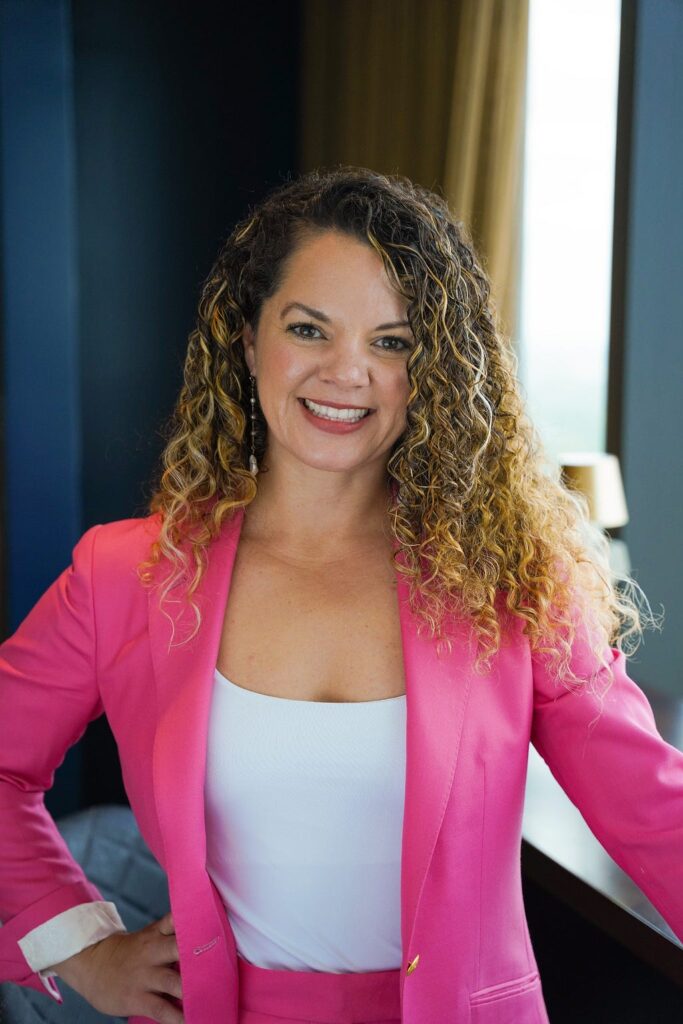Impactful Communication: Alexis Rose Quintal Of Rosarium PR and Marketing Collective On 5 Essential Techniques for Becoming an Effective Communicator
An Interview With Athalia Monae
Know your “why.” Before you speak, clarify what you’re really trying to achieve which helps ground everything.
Make it visual. People remember images, not paragraphs.
Pause with power. Silence when used well is more commanding than any filler word.
Speak to one and not many. Imagine your ideal listener. Write and speak like you’re having coffee with them.
Practice the pivot. Whether on stage or in an interview, things will go sideways. The most effective communicators aren’t perfect but instead, agile.
In an age dominated by digital communication, the power of articulate and effective verbal communication cannot be understated. Whether it’s delivering a keynote address, leading a team meeting, or engaging in a one-on-one conversation, impactful speaking can open doors, inspire change, and create lasting impressions. But what truly sets apart an effective communicator? What techniques and nuances elevate a speech from mundane to memorable? As part of this series, we had the pleasure of interviewing Alexis Rose Quintal.
Alexis Rose Quintal, Owner and CEO of Rosarium PR and Marketing Collective is a powerhouse in personal branding and media relations. With over a decade of experience spanning top agencies, universities, and mission-driven organizations, Alexis has helped entrepreneurs, executives, and emerging leaders craft a public presence rooted in purpose and authenticity. A former college professor, she now serves as a mentor at the University of Tampa’s Lowth Entrepreneurship Center and hosts the Thought Garden On Air podcast, where she spotlights bold voices and fresh perspectives. Known for her dynamic speaking style, Alexis is a frequent presenter at conferences like Podfest and the New York Restaurant Show, and was recently honored as a TBBW Women Who Win recipient and 40 Under 40 at her Alma Mater, Salem State University. At the heart of her work is a simple belief: when people are empowered to communicate clearly and confidently, they become unstoppable.
Thank you so much for joining us in this interview series. Before we dive into our discussion about communication, our readers would love to “get to know you” a bit better. Can you share with us the backstory about what brought you to your specific career path?
I’ve always been passionate about storytelling and making sure people are seen for who they truly are. Early in my career across universities, nonprofits, and creative agencies, I kept noticing the same pattern. Brilliant people were doing meaningful work, but no one knew about it. That gap sparked the vision for Rosarium. I built the collective to focus on personal branding, media strategy and visibility that actually makes a difference. As a former college professor, I still lead with an educator’s mindset where I teach through media, messaging, and moments that shape public perception.
Can you share the most interesting story that happened to you since you started your career?
One of the most interesting and full-circle moments in my career actually involves the person who inspired me to become an entrepreneur in the first place: my dad. From a young age, I watched him build businesses with a clear vision of his goals. That experience planted the seed in me early on that it was possible to create something of your own and make a real impact.
Fast forward to today, and my dad is actually one of my top clients. I now get to support his businesses with marketing and brand strategy, helping bring his vision to life through storytelling, digital campaigns, and community building. It’s surreal at times, giving back to the person who sparked this whole journey for me!
You are a successful business leader. Which three character traits do you think were most instrumental to your success? Can you please share a story or example for each?
Three traits that have been key to my success are resilience, adaptability, and teaching ability.
Resilience has kept me moving forward through tough moments, like when I lost a major client early on. Instead of folding, I doubled down, rebuilt my pipeline, and signed two new clients within a month. It taught me to treat setbacks as redirections.
Adaptability has been essential in an industry that changes constantly. When the pandemic hit, I quickly shifted strategies to help clients go digital.
My Teaching ability sets me apart. Whether I’m guiding a team or mentoring a client, I love breaking complex ideas into simple steps. Helping others grow is one of the most rewarding parts of what I do.
Ok, thank you for that. Let’s now jump to the primary focus of our interview. Let’s begin with a basic definition so that we are all on the same page. How would you define an “Effective Communicator?” What are the characteristics of an effective communicator?
An effective communicator is someone who speaks with people and not at them. It’s about clarity, connection, and courage. Great communicators listen first, adapt often and never lose sight of purpose.
How can one tailor their communication style to different audiences or situations?
You have to listen louder than you speak. That means researching your audience, mirroring their energy, and speaking their language, whether it’s boardroom lingo or casual storytelling. The key is to align your tone with what the moment calls for.
Can you provide an example of a time when you had to adapt your communication style to reach a particular audience successfully?
At the New York Restaurant Show, I quickly realized the audience wasn’t there for theory but instead, they wanted real-world takeaways they could use immediately. So, I ditched the slide-heavy presentation and leaned into storytelling. I used industry-specific analogies, real client case studies and a bit of humor to make marketing concepts feel tangible and relevant. The energy in the room shifted, and engagement skyrocketed because the content met them where they were.
How do you handle difficult or sensitive conversations while maintaining open and effective communication?
I believe the key to handling difficult or sensitive conversations is a blend of transparency and empathy. I never shy away from being honest, even when the message is hard to deliver, but I’m always intentional about how I say it. It’s not just what you communicate, it’s how you make the other person feel in the process.
When I need to have a tough conversation whether it’s with a client, a team member, or a partner I start by acknowledging their perspective. I want them to feel heard and understood before I offer my input. Then, I communicate clearly and directly, but with compassion. I’ll say something like, “This may be a hard truth, but I’m sharing it because I respect you and I want us to grow from it.”
In your experience, how does storytelling play a role in impactful speaking? Why do you think stories are effective in communication?
Storytelling is how we make meaning. Facts tell, stories sell. When I coach leaders, I don’t just teach them how to list credentials. Instead, I teach them how to share a defining moment. That’s what makes people lean in.

What are your “5 Essential Techniques for Becoming an Effective Communicator”?
1 . Know your “why.” Before you speak, clarify what you’re really trying to achieve which helps ground everything.
2 . Make it visual. People remember images, not paragraphs.
3 . Pause with power. Silence when used well is more commanding than any filler word.
4 . Speak to one and not many. Imagine your ideal listener. Write and speak like you’re having coffee with them.
5 . Practice the pivot. Whether on stage or in an interview, things will go sideways. The most effective communicators aren’t perfect but instead, agile.
How do you integrate non-verbal cues into your communication? Can you provide an example of its importance?
I’m big on body language! Eye contact, posture, and hand gestures matter. In a recent panel, I noticed an audience member disengaging. I shifted my stance to face that section directly within minutes and they were re-engaged.
How has digital communication changed the way you convey your messages? Are there any specific challenges or advantages you’ve encountered?
Digital communication has completely transformed the way I convey messages, for both myself and my clients. It’s no longer just about getting the message out there; it’s about creating connection, value, and trust across multiple platforms in real time. The digital landscape has made it possible to reach targeted audiences faster and more personally than ever before. Whether it’s a compelling Instagram reel, a strategic LinkedIn post, or an email campaign, we can now tell stories in bite-sized, engaging ways that resonate with people exactly where they are.
Public speaking is a common fear. What techniques or strategies do you recommend to manage and overcome stage fright?
Public speaking is definitely one of those fears that never fully goes away, but it does get easier with practice. I’ve been speaking publicly for over 15 years now, and I genuinely believe it takes about 100 times before you really start to feel comfortable and confident in your own voice on stage.
For me, the most powerful strategy has always been repetition. The more you do it, the more you realize that nerves are normal and manageable. Every stage, every audience, every setting helps you build that muscle.
What additional resources do you recommend for individuals looking to improve communication skills?
One of the most underrated resources for improving communication skills is real life. I always encourage people to speak up as often as possible, whether it’s in a Zoom meeting, at a networking event, during a team huddle, or even around the dinner table with family. Every time you raise your hand, share an idea, or contribute to a conversation, you’re building your voice and refining your delivery.
Of course, there are plenty of great books, podcasts, and courses out there, but nothing replaces consistent, real-world practice. Communication is a skill you develop by doing, not just studying.
Start small. Challenge yourself to speak up once in every meeting. Introduce yourself to someone new at an event. Share a personal story at a family gathering. These moments may feel minor, but over time they build incredible confidence and clarity. Eventually, what once felt scary becomes second nature and that’s what prepares you to shine on bigger stages when the opportunity comes.
You are a person of great influence. If you could start a movement that would bring the most amount of good to the most amount of people, what would that be? You never know what your idea can trigger. 🙂
I’d start a movement called “Voice First” focused on helping underestimated people find their voice and use it boldly. From students to survivors to solopreneurs, the ripple effects of visibility are life-changing.
How can our readers further follow you online?
You can connect with me at alexisquintal.com or visit my agency at rosarium.work. Follow along on Instagram @alexis.rose.quintal or @rosarium.work and on LinkedIn at Alexis Quintal. And, if you’re ready to grow your brand, I’d love to connect and grow with YOU!
Thank you for the time you spent sharing these fantastic insights. We wish you only continued success in your great work!
Impactful Communication: Alexis Rose Quintal Of Rosarium PR and Marketing Collective On 5 Essential… was originally published in Authority Magazine on Medium, where people are continuing the conversation by highlighting and responding to this story.
